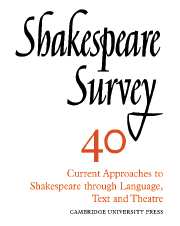Book contents
- Frontmatter
- Reconstructing Shakespeare, or Harlotry in Bardolatry
- Playing Shakespeare
- Take me to your Leda
- Sign Theory and Shakespeare
- Time in Richard III
- New Concepts of Staging A Midsummer Night’s Dream
- Henry V as Working-House of Ideology
- Shakespeare and his Sources: Observations on the Critical History of Julius Caesar
- The Speculative Eye: Problematic Self-Knowledge in Julius Caesar
- Learning by Talking: Conversation in As You Like It
- Measure for Measure: Mirror for Mirror
- Allegory and Irony in Othello
- Cruelty, King Lear and the South African Land Act 1913
- The Rationale of Current Bibliographical Methods: Printing House Studies, Computer-Aided Compositor Studies, and the Use of Statistical Methods
- Shakespeare’s Late Plays at Stratford, Ontario
- Shakespeare Performances in London, Manchester and Stratford-upon-Avon 1985–6
- The Year's Contributions to Shakespearian Study 1 Critical Studies
- 2 Shakespeare’s Life, Times, and Stage
- 3 Editions and Textual Studies
- Index
Henry V as Working-House of Ideology
Published online by Cambridge University Press: 28 March 2007
- Frontmatter
- Reconstructing Shakespeare, or Harlotry in Bardolatry
- Playing Shakespeare
- Take me to your Leda
- Sign Theory and Shakespeare
- Time in Richard III
- New Concepts of Staging A Midsummer Night’s Dream
- Henry V as Working-House of Ideology
- Shakespeare and his Sources: Observations on the Critical History of Julius Caesar
- The Speculative Eye: Problematic Self-Knowledge in Julius Caesar
- Learning by Talking: Conversation in As You Like It
- Measure for Measure: Mirror for Mirror
- Allegory and Irony in Othello
- Cruelty, King Lear and the South African Land Act 1913
- The Rationale of Current Bibliographical Methods: Printing House Studies, Computer-Aided Compositor Studies, and the Use of Statistical Methods
- Shakespeare’s Late Plays at Stratford, Ontario
- Shakespeare Performances in London, Manchester and Stratford-upon-Avon 1985–6
- The Year's Contributions to Shakespearian Study 1 Critical Studies
- 2 Shakespeare’s Life, Times, and Stage
- 3 Editions and Textual Studies
- Index
Summary
Among the features specific to the text of Henry V its apparent property of giving rise to particularly acrimonious division of opinion has often been noted. To say that there are two camps sharply opposing each other is indeed almost a commonplace of critical literature, the one camp fervently applauding what they see as a panegyric upon, indeed a rousing celebration of, ‘the mirror of all Christian Kings’ and most successful English monarch of all the histories; and the followers of the other camp deriding with no less conviction the exaltation of a machiavellian conqueror in a rapacious and, after all, senseless war. Little wonder, then, that in 1939 Mark Van Doren should have thought even Shakespeare’s genius baffled vis-à-vis such hopeless material; that E. M. W. Tillyard should have considered Henry V, remarkably enough at the time of the Second World War, a dramatic failure on account of its puerile patriotism and lack of form; or that Moody E. Prior should consider the play ‘a theatrically handsome fulfillment of an obligation, performed with skill but without deep conviction’.
- Type
- Chapter
- Information
- Shakespeare Survey , pp. 63 - 68Publisher: Cambridge University PressPrint publication year: 1988

